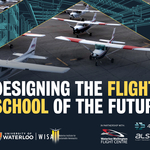4AIR Congratulates Waterloo Institute of Sustainable Aeronautics “Designing the Flight School of the Future” Contest Winners

- Contest to Promote Advanced Design for Aviation Ground Facilities Co-sponsored by 4AIR
- Contest Created to Generate New Ways for Facilities to Reduce Emissions from Flight, Maintenance and Other Activities
BOSTON–(BUSINESS WIRE)–4AIR, the first and only rating system focused on comprehensive sustainability in private aviation, today congratulated the winners of the Waterloo Institute of Sustainable Aeronautics “Designing the Flight School of the Future” contest. First place went to Aileron Consulting Group; second place was awarded to Stack Effect; and third place went to 2FH Design. The contest was organized by the University of Waterloo-based institute, among the world’s leading centers for sustainable aviation research and education. As the basis of the competition, the institute asked contestants to support sustainability by reimagining the Waterloo Wellington Flight Centre, one of Canada’s largest flight training facilities. 4AIR President Kennedy Ricci served on the panel of judges for the contest that 4AIR co-sponsored.
“While carbon offset credits and Sustainable Aviation Fuel are today’s tools to reduce emissions from flight operations, we have to think about a comprehensive approach to sustainability,” said Ricci. “This holistic thinking requires looking at sustainability across all functions of our industry, from ground facilities and operations to training and flight schools. Aviation has a long history of innovation, and this contest is a great opportunity to encourage these kinds of ideas for the entire ecosystem.”
Entrants were invited to design two new buildings for the Waterloo Wellington Flight Centre: a main building for administration, instruction and other functions; and a hangar for aircraft maintenance. The design of these buildings was required to meet net-zero energy and carbon neutral performance targets using strategies such as high-performance envelope and sustainable materials, energy efficiency measures and integration of electric charging stations and electric storage for ground vehicles and aircraft, among other ideas. A judging premium was placed on real-world feasibility.
Winners’ designs incorporated novel and sustainable construction materials, renewable energy, flight-inspired architecture and thoughtful designs for stakeholder usage that could easily be replicated across other locations. The $5,000 first place prize, co-sponsored by 4AIR and the Waterloo Wellington Flight Centre, was part of nearly $10,000 awarded to three winning teams.
4AIR’s sponsorship of the “Designing the Flight School of the Future” contest organized by the University of Waterloo in Ontario, Canada also spoke to the company’s global focus. “Sustainability is a global challenge that requires global solutions,” said Ricci. “We want to advance aviation sustainability throughout the world and seek the best partners anywhere in the world to do so.”
Another example is 4AIR’s partnership with the Aviation Impact Accelerator (AIA), led by the University of Cambridge in the United Kingdom. The partnership supports the AIA’s research and development of interactive, evidence-based tools to engage decision-makers, the aviation industry and the public about how to achieve the ultimate goal of Net Zero Flight, under which flight activity would generate no additional climate-changing emissions.
Contributions generated from “Climate Champions” – the highest of 4AIR’s four levels of aviation sustainability – allows 4AIR to issue grants and make contributions in research to support new technologies aimed at reducing emissions in aviation. Established as the Aviation Climate Fund, to which individuals, companies and other aviation industry participants may contribute, it advances leading-edge research that shapes the future of aviation.
About 4AIR
4AIR is an industry pioneer offering sustainability solutions beyond just simple carbon neutrality. Its industry-first framework seeks to address climate impacts of all types and provides a simplified and verifiable path for private aviation industry participants to achieve meaningful aircraft emissions counteraction and reduction.
The 4AIR framework offers four levels, each with specific, science-based goals, independently verified results and progressively greater impacts on sustainability that make it easy for private aviation users to pursue sustainability through access to carbon markets, use of Sustainable Aviation Fuel, support for new technologies and other strategies.
For more information, visit us at www.4air.aero.
About the Waterloo Institute for Sustainable Aeronautics
The Waterloo Institute for Sustainable Aeronautics (WISA) mission is to be the world’s leading hub for sustainable aeronautics research, technology, and education. Designed to be different, WISA mobilizes the interdisciplinary research capacity of all six faculties at the University of Waterloo to drive meaningful and lasting change within the aviation and aerospace industries. Find out more at uwaterloo.ca/wisa.
About the Waterloo Wellington Flight Centre
Founded in 1932 at Lexington field in North Waterloo, the Waterloo Wellington Flight Centre (WWFC) is deeply rooted in the Waterloo region. WWFC is proud to offer a state-of-the-art facility, partner with two prestigious post-secondary institutions, offer industry-recognized training to individuals seeking a career in aviation and still strongly support the general aviator. WWFC’s Vision is to be the most respected flight school in Canada, providing excellence in training, equipment and facilities creating the highest degree of customer satisfaction and success.
Contacts
Media:
Sarah Churbuck
The Hubbell Group, Inc.
Mobile: +1-561-289-6362
Email: schurbuck@hubbellgroup.com

